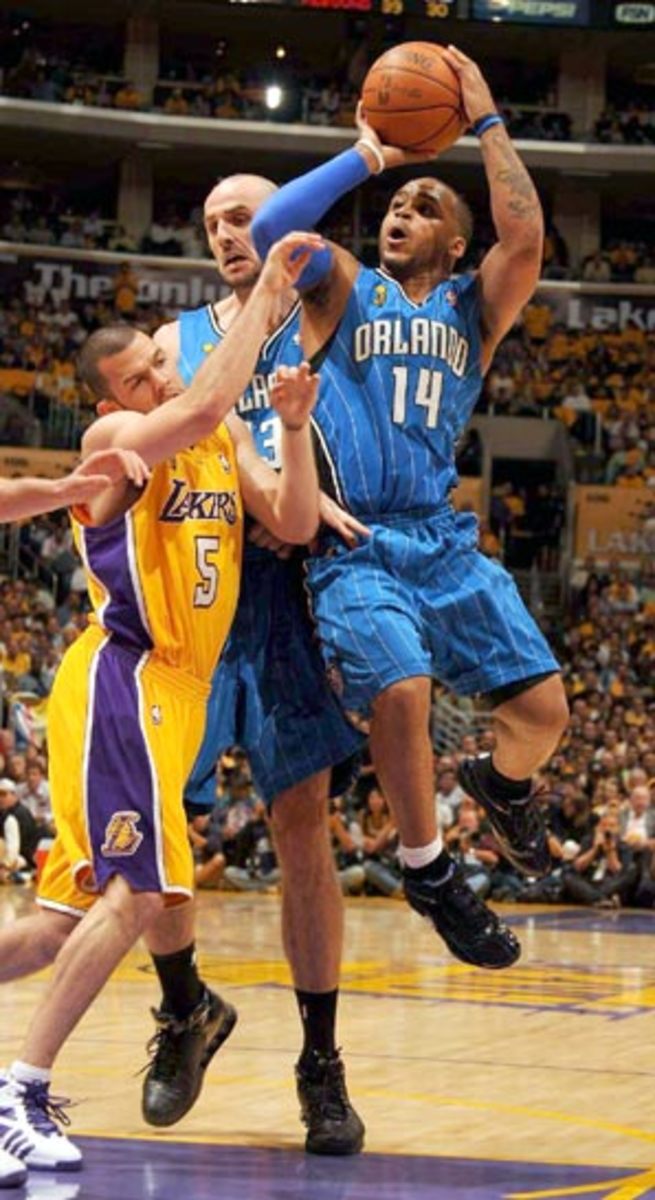
Nelson's return leaves Van Gundy with critical choice
LOS ANGELES -- There is a saying in sports that has been repeated countless times by coaches everywhere: You dance with the one that brung you. It's what baseball managers say in the playoffs when they are asked to explain why they chose to bring back their ace on three days rest instead of sending out the well-rested fourth starter. It's what hockey coaches come back with in the postseason when they are second-guessed about not making a change in goal after the starter spends most of the game digging the puck out of his own net. It's a basic coaching tenet: when the games become more meaningful, you trust the guys that got you there.
Stan Van Gundy, however, appears to be willing to defy that principle. Rafer Alston has started 48 games for the Magic since coming over from Houston at the February trading deadline. He averaged 14.6 points and 6.2 assists in an Orlando uniform in the regular season and is averaging 12.3 and 4.2 in the playoffs. He has had some clunkers (a four-point, two assist output in Game 2 of the conference finals) but he has also had a few breakouts (like a 26-point effort in Game 4 of the same series). But even with his fluctuating play, Alston's role as the team's top point guard has never been in question.
That is, until now. In Game 1, Van Gundy elected to platoon Alston with Jameer Nelson, the Magic's ex-starter who made his first appearance since shredding the labrum in his right shoulder in February. The results weren't pretty: Nelson played the entire second quarter and finished the game with six points (on 3-of-9 shooting) and four assists in 23:28. Alston finished with six points (on 2-of-9 shooting) and one assist in 24:32 and exited the Magic locker room with a jarring feeling of confusion over his role that he didn't have when he walked in.
"It was odd. I mean, I think everyone can see that," Alston said. "That's unusual to start the game and then you don't even touch the court in the second quarter."
The risk with distributing minutes evenly between two players is that it becomes more difficult for either player to establish a rhythm. Alston implied that the diminished playing time affected him, particularly in the second half. Van Gundy called it an excuse.
"Having that affect his play, that's up to him," said Van Gundy. "If I'm looking from the outside, that sounds like an excuse to me."
"I'll give you a good excuse," Alston said. "I sat 12 minutes real game time [in the second quarter], I sat about 30 minutes real life time. So there's an excuse."
That Van Gundy is comfortable with Nelson isn't surprising. Nelson has been the Magic's starter for the last two years under Van Gundy and this season emerged as an All-Star for the first time. It was Van Gundy who convinced Nelson to not worry about his deficiencies as a distributor and embrace his ability to be a scoring point guard and play a leading role in the Magic's bombs-away offense. And Nelson was effective, averaging a career-high 16.7 points before bowing out with the injury.
It's also clear that Van Gundy isn't totally comfortable with Alston, a sometimes dazzling playmaker and streaky shooter who is prone to occasional mental lapses.
If this were the same Nelson that propelled the Magic to the top of the conference in January, the who-should-play debate would be a no-brainer. But it isn't the same Nelson. The January version of Nelson wouldn't have passed up open jump shots, as Nelson did several times in Game 1, and wouldn't have missed badly on the ones he took. That Nelson wouldn't have looked winded after about a six and a half minutes stretch in the second quarter.
What Van Gundy has is a shell of the old Nelson, a player that is desperately trying to regain his old form in a short period of time. Despite that, Van Gundy seems willing to give Nelson the opportunity to reclaim his role as the Magic's top playmaker and let Alston twist in the wind. That could be dangerous. The Magic don't have enough weapons for the point guard to be a position of weakness; they need one of them to step up. An informal poll of a handful of NBA coaches, scouts and executives over the weekend yielded the same answers: Van Gundy should settle on one and play him the bulk of the minutes. That leaves Van Gundy with a choice: does he go with the player he trusts or does he trust the one that brung him?





